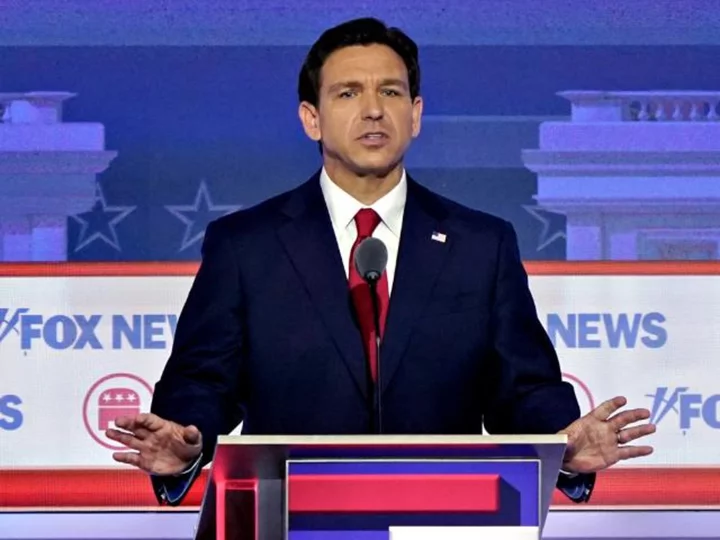Asked Wednesday night at the first Republican presidential debate if he would support sending US Special Forces into Mexico to confront drug cartels operating in the country, Florida Gov. Ron DeSantis answered clearly: "Yes, and I will do it on day one."
"The president of the United States has got to use all available powers as commander in chief to protect our country and to protect the people. So when they're coming across, yes we're going to use lethal force, yes we reserve the right to operate," he said.
He reemphasized his plan in a tweet after the debate: "Yes, I would send U.S. Special Forces to take out the Mexican drug cartels."
DeSantis spokesperson Bryan Griffin told CNN, "Ron DeSantis will declare a national emergency on day one, mobilize all military resources, declare the cartels to be narco-terrorists, and change the rules of engagement on the border. The full force of the federal government will be utilized to ensure that illegal drug flow is stopped, and he will bring to bear every tool he has to this end."
DeSantis is not the only Republican to call for military action against drug cartels. But while experts said frustration over the cartels in Mexico and their impact on Americans is valid, they warned that taking military action on the soil of the US' southern neighbor could trigger a diplomatic crisis.
Vanda Felbab-Brown, director of the Brookings Institution's Initiative on Nonstate Armed Actors, explained that designating the cartels as a foreign terrorist organization would allow "for lethal action," though that "doesn't eliminate the diplomatic controversy and outrage in Mexico that any Mexican government would have."
Such a designation could have "major implications for trade," Felbab-Brown said.
"We can say what we want on our side -- from the perspective of the Mexican government and Mexican military, that would be very much seen as a massive violation of sovereignty," she said.
Earl Anthony Wayne, a career diplomat who was the US ambassador to Mexico from 2011 to 2015, echoed that sentiment, saying US military action in Mexico has been "an extremely sensitive issue" for years.
"Doing this in the way that he sounded like he was going to do it would create a massive crisis with Mexico," Wayne said of DeSantis' comments. "Whoever's in charge" of Mexico, even if it were someone with a good relationship with the US, "would be forced to take drastic action and close the borders or do other things."
As for the authority to deploy US forces in that way, Wayne said it would fall "under the same rubric of launching a military operation in any other country around the world." And while presidents don't always get approval from Congress before taking military action, they do have to contend with Congress afterward.
"There would have to be a justification," he said. "And Congress would raise questions -- why didn't you seek authority for this, what's the emergency that set this off? I mean, if you wanted to do it without telling anybody and without working anything out with the government of Mexico, it would create a lot of uproar in the United States, as well as with Mexico."
Ezra Cohen, a fellow with the Hudson Institute who was an acting assistant secretary of defense for special operations and low-intensity conflict in the Trump administration, said a president would "almost certainly" need to notify Congress after taking such an action.
"Congress could pass a law prohibiting funding for such operations, but it would be hard for Congress to prevent this sort of activity," he said.
Cohen added, however, that the US is "out of options" in how to deal with the cartels because the Mexican government has proven to be "too corrupt and not strong enough to deal with this."
Both Wayne and Felbab-Brown agreed that the situation is dire but said the best path forward would be to find a way to work with the Mexican government. They acknowledged, however, that it has become increasingly difficult to do so.
Felbab-Brown said that right now, "there is no cooperation" with the government, but there "are still officers, law enforcement officials, government officials who understand the narcos are taking over Mexico." Taking military action, she said, would narrow options for future cooperation "tremendously."
"It's not just that they are not cooperating with us; they are letting Mexico be eaten alive by the cartels," Felbab-Brown said. "But, you know, lethal military action, certainly involving US soldiers ... would be enormously challenging in terms of the optics and the bilateral relationship, and it would just sour even people who want to cooperate with the US. It would make it very difficult for them."
And military action, Wayne said, is not a serious idea to deal with what has become a "massive problem."
"These groups have grown and become powerful; they're all mixed with the civilian population," he said. "Give me a serious solution here. Don't just make us all feel happy because you say you're going to send the Special Forces in. ... The point is to cut the flows off, it's not just to kill a couple of cartel members in a small place where they put fentanyl together in a warehouse."

